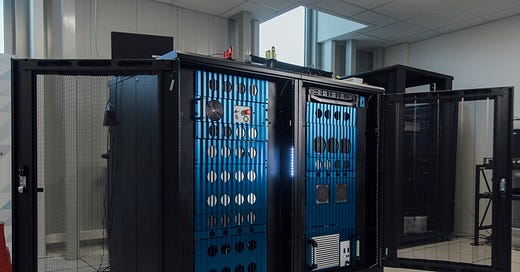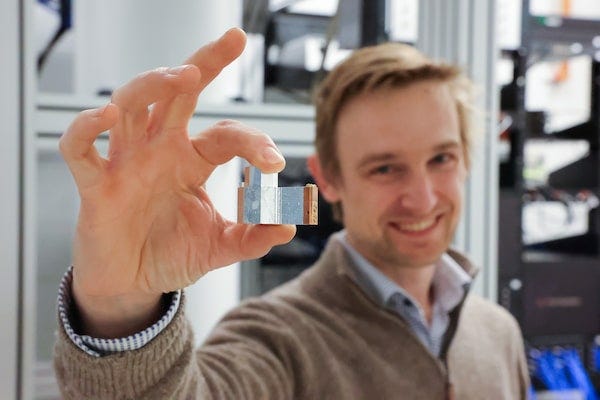Quandela, Sygaldry, Quobly, Quantum eMotion, Nord Quantique (Chad) Rigetti strikes again - The Week in Quantum Computing – June 2nd 2025
Issue #238
Quick Recap
French startup Quobly secured €21M funding for its Q100T project, an initiative to construct a silicon quantum chip with 100 physical qubits. Quantum eMotion Corp has commenced manufacturing its first Quantum Random Number Generator (QRNG) chip. A new quantum algorithm transpilation optimisation method has been developed by a team from Jülich Supercomputing Centre, Virginia Tech, and Purdue University. Scientists at Griffith University and Nanyang Technological University have discovered how to measure and confirm randomness in quantum systems, potential leverage for enhanced security. Quandela launched Belenos, the most potent photonic quantum computer yet, facilitating faster AI computations and quantum machine learning. 'Women for Quantum' discussed the need for leadership shifts to remove barriers for underrepresented groups. This week also saw Rigetti founder and ex-CEO launch AI-quantum fusion startup Sygaldry, and QTech Systems exploring quantum solutions against AI music copyright theft.
The Week in Quantum Computing
Researchers open source QuantumThreatTracker: A tool for quantifying the threat quantum computers pose to public-key cryptosystems.
'QuantumThreatTracker', a tool to quantify the risk quantum computers impose on public-key cryptosystems. It essentially uses data to make estimates on when quantum computers will be strong enough to break public-key cryptographic protocols like Rivest-Shamir-Adleman (RSA) and Diffie-Hellman (DH) that heavily rely on the computational hardness of mathematical problems. As quantum computers improve, the capacity for them to jeopardize various cryptographic protocols increases, creating a fluctuating threat landscape. This novel utility, currently in its proof of concept, was funded by Ofgem and jointly developed by Cambridge Consultants and the University of Edinburgh.
Quandela to launch Belenos, the world's most powerful photonic quantum computer
Quandela, a global leader in quantum computing, has announced the launch of Belenos, the world’s most potent photonic quantum computer. Belenos offers 4,000 times the computing power of its predecessor, displaying an exponential growth rate that surpasses Moore's law predictions. Industries and researchers now have superior access to test innovative algorithms, speed up AI computations and explore quantum machine learning. Quandela aims to continuously increase the computing power, targeting a 16-million-fold boost with a double of qubits expected next year. Furthermore, a collaboration with BTQ Technologies is announced to develop energy-efficient quantum blockchain validation. The advancements play a significant role in knowledge exploration, AI integration and the escalating incorporation of quantum technologies in the private sector. This leap signifies a path to colossal applications in strategic future sectors.
A Manifesto for Women in Quantum
In a recent episode of the "This is Physics" podcast by Physics Magazine, host Julie Gould spoke to members of 'Women for Quantum' (W4Q)—a group of 33 leading female quantum scientists from Europe and Japan who authored the "Women for Quantum—Manifesto of Values". This manifesto calls for a shift in current scientific leadership, funding, and authority models to eliminate barriers faced by women and other underrepresented groups. W4Q representatives, Costanza Toninelli, Ana Predojević, and Marilu Chiofalo, elaborated on the manifesto while two unaffiliated female researchers - Ilana Wisby and Jessica Wade - shared their experiences. With the current accelerating pace in quantum computing, such changes presuppose creating a more inclusive and diverse quantum science environment.
French quantum startup Quobly raises €21M for development of 100 qubit chip - DCD
French quantum computing startup Quobly has raised €21M ($23.7M) to advance its Q100T project, a silicon quantum chip with 100 physical qubits. Of that sum, €15M is a grant from Bpifrance, provided under the France 2030 initiative, with the remaining €6M in Quobly's shareholder equity. The company plans to utilize industry-standard semiconductor tools and processes in manufacturing the processor. Quobly's foundations are rooted in research from CEA and CNRS, and in 2024, it made a partnership with STMicroelectronics aimed at achieving production readiness by 2027. Newly appointed Chairman, former VP of Airbus, Philippe Delmas, joins CEO Maud Vinet as they push for the industrialization of their technology. As Quobly's quantum innovation becomes increasingly tangible, we are reminded that the quantum competition isn't dominated only by tech behemoths.
Quantum eMotion Finalizes QRNG Hybrid Chip Design, Commences Manufacturing with TSMC
Quantum eMotion Corp., the quantum cybersecurity solutions company, has announced the successful completion of its first Quantum Random Number Generator (QRNG) chip design and kick-started manufacturing with global semi-conductor foundry, TSMC. The chip, the first based on the quantum electron tunneling effect and protected by four international patents, "offers high performance in a fully integrated CMOS format," says Quantum eMotion CEO Francis Bellido. Capable of generating over 1 Gbit/sec of true quantum random numbers, this chip marks an important step in enhancing digital security against emerging quantum threats. The QRNG chip market is set to increase from $150 million in 2024 to around $2 billion by 2033. In the face of a rapidly evolving quantum computing world, such developments verify just how instrumental hardware innovations can be in cybersecurity.
Quantum Algorithm Transpilation Improves Performance On Noisy Quantum Processors
Researchers from Jülich Supercomputing Centre, Virginia Tech, and Purdue University have introduced a new quantum algorithm transpilation optimisation method. Led by J.A. Monta˜nez-Barrera, Yanjun Ji, Michael R. von Spakovsky, David E. Bernal Neira, and Kristel Michielsen, the team developed a simulated annealing-based method to improve quantum approximate optimisation algorithm (QAOA) performance on noisy intermediate-scale quantum (NISQ) devices. Their approach reduces the number of two-qubit gates and the overall circuit depth, thereby enabling more complex computations. Benchmark tests on IBM’s 'ibm_fez' quantum computer showed this method surpassed standard transpilation techniques, significantly improving performance for circuits with limited connectivity. This work could help bypass QPU connectivity limitations and increase the scalability and reliability of quantum computations.
How Quantum Computing Could Protect Against AI Music Copyright Theft
2025 saw a next big leap in Quantum Computing's defense ability against AI music copyright theft. Stacey Morris, CTO of QTech Systems, said quantum computers could solve the complex mathematical problems that could detect unauthorized AI-originated music sampling. Quantum Computing's superior computation speed compared to classical methods would significantly expedite the process and potentially save billions in the industry. Emilia Hernandez, Professor of AI at MIT, confirmed the methodology. Despite the promise, critics warn of the higher energy consumption of quantum systems and their relatively unstable nature. As with any technology, balance remains key: Quantum's high processing capability can provide robust copyright defenses, but commercial viability hinges on overcoming existing constraints.
Rigetti Founder Launches New Quantum Firm to Boost AI
In a bid to strengthen the relationship between AI and quantum computing, Rigetti founder Chad Rigetti has initiated a new venture named Sygaldry. This Y Combinator-backed startup perceives an edge over competitors who formed business strategies before the widespread adoption of AI, implying a considerate approach towards integrating quantum computing with AI systems. The inception of Sygaldry emphasises the evolving landscape of quantum computation and its potential to revolutionise AI capabilities.
Certifying the unpredictable a key step in quantum computing
In a significant advancement for quantum computing, scientists have unlocked a method to certify the unpredictability of quantum systems. This groundbreaking revelation, led by researchers at Griffith University and Nanyang Technological University, revolves around the principle of 'quantum randomness' that could potentially revolutionize security in quantum computing. The study, published in Nature Physics, reveals how randomness can be confirmed and measured within quantum systems. This development, underpinning a level of randomness previously considered unverifiable, could open doors for flawlessly secure communication systems and quantum cryptography. "Unpredictability is a resource just like energy," notes Griffith's Associate Professor Geoff Pryde, painting this breakthrough as pivotal to advancing quantum technology. As Dr. Mile Gu from NTU concludes, "if you can certify randomness you've essentially certified the quantum." The bracing evolution underscores that real quantum supremacy may lie in harnessing its inherent unpredictability.
Superconducting diode bridge efficiently converts AC to DC for quantum circuits
Researchers at Massachusetts Institute of Technology (MIT), University of California–Riverside and SEEQC Inc. recently introduced a new system comprised of four superconducting diodes (SDs), which are electronic devices that allow electric current to flow in only one direction and are made of superconducting materials.
Q-CTRL Achieves Computational Gains in Generation of Long-Range Entanglement Enhanced by Error Detection
Quantum infrastructure software leader, Q-CTRL, has broken new ground with two record-setting quantum computing demonstrations. Leveraging low-overhead error detection, Q-CTRL's approach boosts computational efficiency and successfully achieved the largest entanglement generation up to 75 qubits. Their process combines error suppression and error detection to improve quantum computer performance. Specifically, Q-CTRL implemented a new state-of-the-art in long-range CNOT gate, achieving over 85% fidelity across up to 40 lattice sites. Moreover, they produced a Greenberger–Horne–Zeilinger state involving up to 75 qubits — unprecedented in the published literature. The new paradigm signifies a real breakthrough in quantum computing, offering substantial advancements for more robust and powerful quantum machines.
Accelerating the arrival of fault-tolerant quantum computers with next-generation materials
A research study led by Oxford University has developed a powerful new technique for finding the next generation of materials needed for large-scale, fault-tolerant quantum computing. This could end a decades-long search for inexpensive materials that can host unique quantum particles, ultimately facilitating the mass production of quantum computers. The results have been published in the journal Science.
Quebec startup shows progress toward practical quantum computing
Quebec-based startup Nord Quantique is making strides in overcoming a fundamental hurdle in the pathway towards commercialised quantum computing: the technology's error-prone nature. The company, under the leadership of CEO Julien Camirand-Lemyre, recently announced they had pioneered an in-house quantum device to encode a form of error detection for the first time. Unlike industry behemoths Google, Microsoft, and Amazon, Nord Quantique's groundbreaking approach involves error-checking via the same hardware used for computation. Professor Yvonne Gao of the National University of Singapore applauded the company's progress, highlighting the diversity of their approach in this emerging market, while theoretical physicist Daniel Gottesman notes the lack of a clear 'winner' in the quantum landscape means startups like Nord Qantique could lead the way to quantum breakthroughs.
VanEck launches Europe’s first quantum computing ETF
VanEck has launched Europe's first quantum computing ETF, listed on Deutsche Borse, that will also list on the London Stock Exchange. Known as the VanEck Quantum Computing UCITS ETF (QNTM), it seeks to track the MarketVector Global Quantum Leaders index, encapsulating 30 companies engaged in quantum computing development or application. These include "pure plays" like IONQ, Rigetti, D-Wave, and large companies like IBM, Alphabet, and Honeywell investing in the quantum field. The ETF's selection criterion includes a company's revenue exposure and the number of its relevant patents. As Martijn Rozemuller, CEO of VanEck Europe, put it, "We are currently experiencing the start of the quantum computer era," indicating the ETF's apt timing.
Huang and Zuckerberg are Wrong About Quantum Computing Timelines
Tech industry leaders Mark Zuckerberg and Jensen Huang may have drastically underestimated the arrival of "useful" quantum computers, claims journalist Russ Fein. Contrary to Zuckerberg and Huang's predictions of "decades plus out" or "15-30 years away", Fein suggests quantum computers that can solve real-world problems better than classical computers are closer than thought. Despite the 80+ types of quantum computers in development, no one has yet created a quantum machine that can outperform traditional computing. However, Fein argues the barometer of a "useful" machine is fluid, highlighting the rapid improvements in physical and logical qubits, gate performance, and error correction in quantum computing. As quantum progress accelerates, countering the inertia of long-established predictions becomes imperative.







